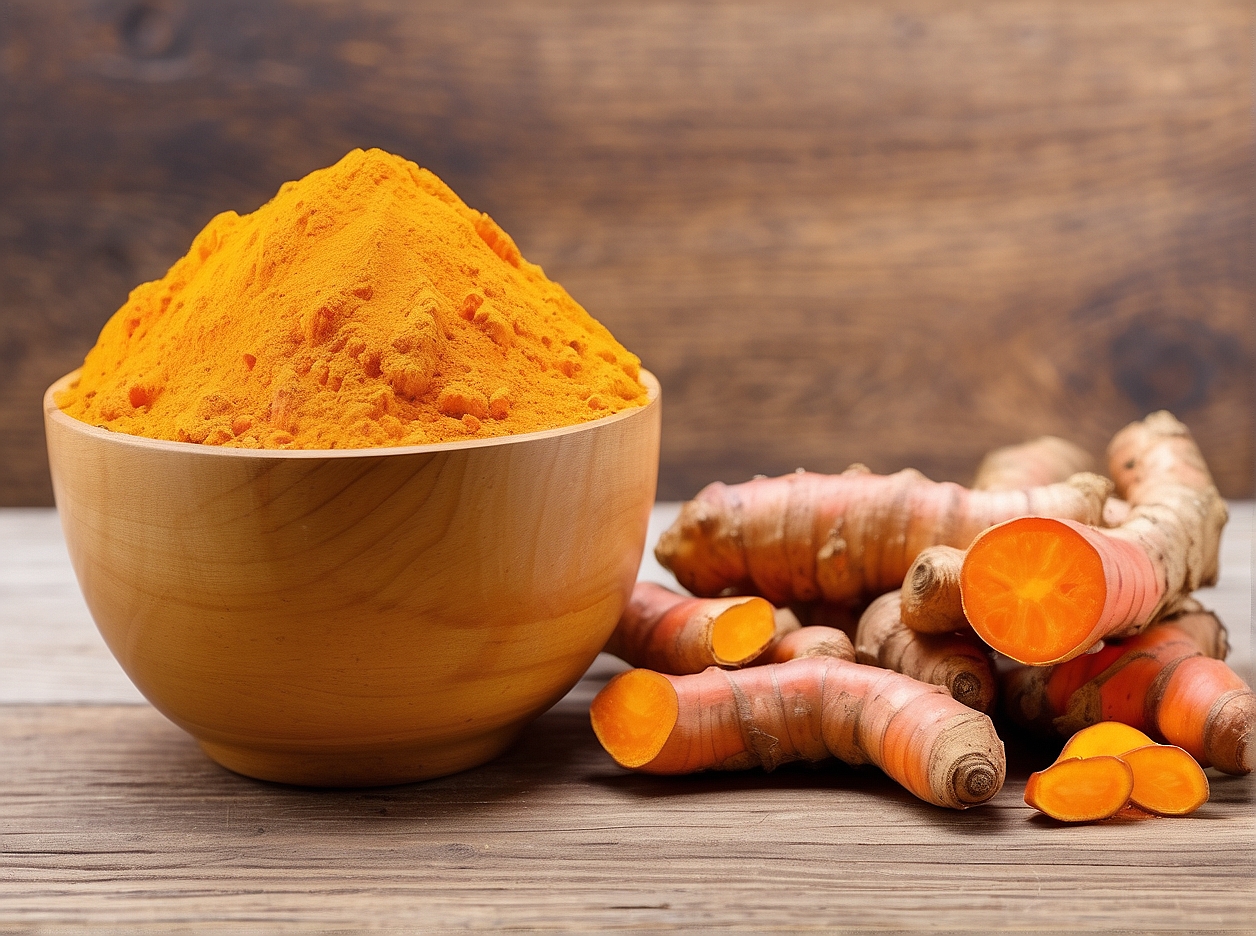The story of turmeric begins in the lush fields of Southeast Asia, where the Curcuma longa plant has been cultivated for over 4,000 years. This vibrant, golden spice has not only colored the culinary traditions of India, China, and the Middle East but has also found a revered place in Ayurvedic and traditional medicine.
The Healing Power of Curcumin
At the heart of turmeric’s potency lies curcumin, a bioactive compound celebrated for its powerful anti-inflammatory and antioxidant properties. This golden gem has captured the attention of the health and wellness community, earning turmeric a distinguished status as a superfood.
Health Benefits of Turmeric
- Anti-Inflammatory Marvel – Turmeric’s curcumin is a natural anti-inflammatory agent, potentially reducing inflammation at the molecular level. This property makes it valuable for conditions such as arthritis and other inflammatory disorders.
- Antioxidant Shield – Acting as a potent antioxidant, turmeric helps neutralize free radicals in the body, offering protection against oxidative stress. This, in turn, may contribute to the prevention of chronic diseases and aging.
- Brain Health Booster – Emerging studies suggest that curcumin can cross the blood-brain barrier, with potential neuroprotective effects. It may aid in delaying or even reversing brain diseases and age-related decreases in brain function.
- Heart-Healthy Ally – Turmeric may positively impact heart health by improving the function of the endothelium (the lining of blood vessels), regulating blood pressure, and reducing inflammation and oxidation—key factors in cardiovascular diseases.
- Digestive Harmony – Traditionally used to soothe digestive discomfort, turmeric may assist in maintaining a healthy digestive system. It can stimulate bile production, aiding in digestion and reducing symptoms of bloating and gas.
Skin Condition Benefits
Turmeric is often touted for its potential benefits in addressing various skin conditions. Here are some ways in which turmeric may contribute to skin health.
- Anti-Inflammatory Properties – Turmeric contains curcumin, a compound known for its potent anti-inflammatory properties. Applying turmeric topically may help reduce inflammation and redness associated with skin conditions like acne, psoriasis, and eczema.
- Acne Treatment – The anti-inflammatory and antibacterial properties of turmeric may be beneficial for individuals dealing with acne. It can help calm irritated skin and reduce the appearance of acne lesions.
- Eczema Relief – Eczema is often characterized by itchy and inflamed skin. Turmeric’s anti-inflammatory effects may provide relief for individuals with eczema, helping to soothe irritated skin.
- Psoriasis Support – Psoriasis involves the rapid buildup of skin cells, leading to scaling and redness. Turmeric’s anti-inflammatory properties may help manage symptoms and promote healthier skin.
- Wound Healing – Turmeric has been traditionally used for wound healing. Its antiseptic and antibacterial properties may help prevent infections and support the natural healing process of the skin.
How to Use Turmeric for Skin
- Turmeric Face Mask – Create a paste by mixing turmeric with honey or yogurt. Apply it as a face mask to nourish the skin and address issues like acne and inflammation.
- Turmeric and Coconut Oil for Dry Skin – Blend turmeric with coconut oil to form a moisturizing paste. This can be applied to dry or flaky skin to provide hydration and promote skin health.
- Turmeric and Aloe Vera Gel – Combine turmeric with aloe vera gel for a soothing and cooling effect on the skin. This mixture may be beneficial for sunburns or irritated skin.
- Spot Treatment for Acne – Create a paste using turmeric and a small amount of water. Apply this mixture directly to acne spots for targeted treatment.
CAUTION:
While turmeric is generally considered safe for topical use, it may temporarily stain the skin. Conduct a patch test before applying turmeric to a larger area to ensure there are no adverse reactions. If you have specific skin concerns or conditions, it’s advisable to consult with a dermatologist before using turmeric as a remedy.
Studies Supporting Turmeric’s Superfood Status
- Curcumin and Cancer Prevention – Research suggests that curcumin may play a role in preventing and treating cancer. It has demonstrated anti-cancer effects in various stages of cancer development, inhibiting the growth of cancer cells.
- Turmeric and Joint Health – Studies exploring the efficacy of turmeric in managing joint conditions, such as osteoarthritis and rheumatoid arthritis, have shown promising results, with curcumin acting as a natural and well-tolerated alternative.
- Cognitive Benefits of Curcumin – Clinical trials indicate that curcumin’s anti-inflammatory and antioxidant properties may have potential benefits in preventing or delaying the onset of neurodegenerative diseases like Alzheimer’s.
Incorporating Turmeric Into Your Diet
- Golden Milk – Create a comforting golden milk by combining turmeric with warm milk and a touch of honey.
- Turmeric Infused Soups – Enhance the flavor and nutritional profile of your soups by adding a pinch of turmeric.
- Curcumin-Rich Curries – Spice up your curries with turmeric for both flavor and health benefits.
- Turmeric Smoothies – Blend turmeric into your favorite smoothies for an extra nutrient boost.
Boosting Curcumin’s Bioavailability by 2,000%
Curcumin doesn’t absorb into the bloodstream easily and therefore relies on methods of increasing its bioavailability.
Black pepper contains a compound called piperine that helps to increase the rate at which turmeric is absorbed by the body. Research shows that piperine can increase the bioavailability of curcumin by 2000%.
This method is also beneficial to the absorption of Iron.
Additional Reading/References
Science Direct (Publications on health benefits of turmeric)
National Library of Medicine (Clinical trials and science papers on turmeric)
National Library of Medicine (Effects of piperine)
NutritionFacts.org (Publication on combining turmeric with black pepper)


Leave a Reply